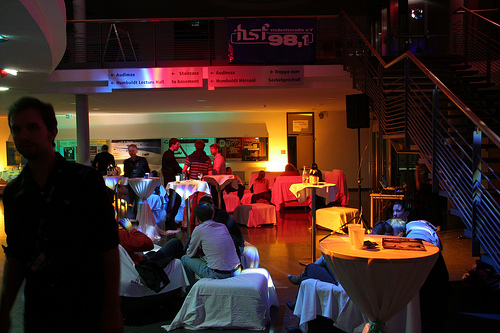Personal Learning and Maturing Environments
I’m in Karlsruhe in Germany at a three and a half day meeting of the European Mature project. The project is ambitious and brings together many partners from different countries. It also brings tother knowledge managements pecialists and computer scientits as well as eductional technicans. I can’t say I awlays understand what is being talked about – at the moment the talk about core ontologies for interlinking a knowledge bus and semantic wiki is a little over my head.
The MATURE project is examining knowledge maturing processes and developing and testing technology based tools to support those processes. The project is based on the idea that the agility of organizations has become the critical success factor for economic competitiveness. Agility requires that companies and their employees together learn and develop their competencies efficiently in order to improve productivity of knowledge work. Failures of organisation-driven approaches to technology-enhanced learning and the success of community-driven approaches in the spirit of Web 2.0 have shown that for that agility we need to leverage the intrinsic motivation of employees to engage in collaborative learning activities, and combine it with a new form of organisational support. For that purpose, MATURE conceives individual learning processes to be interlinked (the output of a learning process is input to others) in a knowledge-maturing process in which knowledge changes in nature. This knowledge can take the form of classical content in varying degrees of maturity, but also involves tasks and processes or semantic structures. The goal of MATURE is to understand this maturing process better, based on empirical studies, and to build tools and services to reduce maturing barriers.
One of the key outcomes of the MATURE project is to develop and test a Personal Learning and Maturing Environment (PLME), embedded into the working environment, enabling and encouraging the individual to engage in maturing activities within communities (both established and newly formed) and beyond. Whilst the idea of knowledge maturing is a little difficult to work with, the idea that a Personal Learning Environment (and learning) can be embedded in evereyday work processes greatly interests me.
Thsi is a lits of what we think the PLME shoudl be able to do:
- The PLME needs to support interchange and discourses with both formal and informal networks as well as the emergence of these in order to support sociofact maturing. These networks may form part of a wider organisational learning and knowledge maturing environment.
- The PLME should facilitate users in supporting the learning of others as a significant form of skills and knowledge development.
- The PLME should provide functionality to facilitate communities in developing collaboratively the tools, documents, routines, vocabulary and symbols that can carry the accumulated knowledge of the community.
- The PLME needs to support active and dynamic knowledge development processes through the socialization, externalization, combination and internalization of knowledge
- The PLME should support information and knowledge workers in the requirement to use different sources to obtain current and accurate information, to extracting and extrapolate key data and to interpret and manipulating that data in order to provide a service.
- The PLME should allow for the collection of loosely coupled tools, both to provide flexibility for the different needs of different contexts and communities and also to facilitate agile development to respond to needs as a when they emerge.


